#guide to disability
Explore tagged Tumblr posts
Text
Writing a Schizophrenic Character: Everything But Hallucinations
Plain text: Writing a Schizophrenic character: Everything But Hallucinations
Hey! Mod Bert here.
So: you’ve decided to write a character with schizophrenia or schizoaffective disorder (there are other disorders on the schizophrenia spectrum but I will be focusing on these for today)
You’ve done it, you have their hallucinations and maybe even delusions picked out. Maybe they are one of many who experience auditory hallucinations or maybe they also have visual hallucinations or a combination. Maybe they have olfactory hallucinations as well. They may have persecutory delusions or delusions of reference or something like Cotard’s delusion or clinical lycanthropy. Awesome, you’ve done it!
What, I hear you say? What do you mean that’s only 2 of the 5 components needed to be diagnosed with schizophrenia? What do you mean, you don’t need to hallucinate at all to be schizophrenic?
What Goes Into a Diagnosis of Schizophrenia
Plain Text: What goes into a diagnosis of schizophrenia
Not a lot of people realize there’s more to schizophrenia and schizoaffective than just hallucinations or delusions. There are 5 diagnostic criterias that are needed for schizophrenia, and only 2 of the 5 are needed for a month, with larger symptoms happening for six months or more. Let’s get into it.
Delusions
Hallucinations
Disorganized speech or thinking*
Disorganized or unusual motor behavior (catatonia)*
Negative symptoms (avolition, anhedonia, flat affect)*
I’m going to focus on disorganized speech/thinking, catatonia, and negative symptoms.
Disorganized Speech/Thinking
Plain Text: Disorganized Speech/Thinking
Schizophrenia and related disorders are often called “thought disorders” for a reason. Speech and thinking can be extremely affected, and for people like me this can be one of the first and most striking examples of an episode coming. Some people will always have disorganized symptoms that will flare during episodes. A myth is that schizophrenia can be indistinguishable with medicine: most people will have some level of symptoms even during moments of peace or “remission”. More on remission later.
So, disorganized speech. Some examples are: word salad (schizoaphasia), thought blocking, poverty of speech (alogia), pressurized speech, clanging, and echolalia.
Word salad: a combination of words that do not make sense together. Often called schizoaphasia for its similarity to jargon in Wernicke’s aphasia, this is instead a disconnection with the brain and not due to damage to the language part of the brain.
(Example: the salad would be yellow in the fat cow).
Thought blocking: A severe loss of thought, often paired with connecting two trains of thought that are not connected
(Example: I went to the………Do you like grapes?)
Poverty of speech: A lack of organic responses to speech or organically speaking, it can be severe enough that a person only responds to questions or in one word responses. Can also happen in severe depression.
(Example: Person A: Did you do anything fun today?
Person B: Yes.
Person A: Oh, what did you do?
Person B: Store
Person A: How was it?
Person B: Fun)
Pressurized speech: A sort of frenzied way of speaking associated with psychosis or mania.
Clanging: Connecting phrases together because of what they sound like instead of meaning
(Example: I went bent tent rent).
Echolalia: Repeating word’s and phrases. Commonly also associated with Autism Spectrum Disorder.
(Example: Person A: I went to the store.
Person B: To the store.)
These are not the only examples but they are some ones I thought I'd highlight, either because they’re well known or I have experience with them, or because they’re famously thought of with other disorders as well and I wanted to point out how things overlap.
Personal experience: I had severe alogia for the duration of my last and worst episode. People thought I was mad at them because of the clipped way I spoke and the lack of really speaking. It got me in a lot of trouble. I didn’t realize what I was saying was different or weird (I have the least insight when it comes to my speaking patterns affected by my schizoaffective, meaning I can’t hear any difference and all of this is from repeated conversations with my mom, who was my caretaker for a bit and knows the most about my speech and what it means). The best solution was talking with people and being honest and educating myself and others. I don’t know about others, but I couldn’t have used AAC at that time.
Catatonia
Plain text: Catatonia
Fun fact: catatonia means unusual motor behaviors! Any unusual motor behaviors mean catatonia. This includes what we think of when we think of catatonia in schizophrenia (inability to move) as well as the opposite (being unable to stop moving) as well as strange movements and ways of holding and moving the body! Catatonia in the DSM-5 includes 3 or more of these 12 behaviors:
-Agitation unrelated to external stimuli
-Catalepsy
-Echolalia
-Echopraxia
-Grimacing
-Mannerism
-Mutism
-Negativism
-Posturing
-Stereotypy
-Stupor
-waxy flexibility
I have some experiences with catatonia-like symptoms but since they were never identified as such I’ll skip those for now. I will say that catatonia is a symptom that can happen in many disorders besides schizophrenia as well.
Negative Symptoms! Yay!
Plain text: negative symptoms! Yay!
So a positive symptom (Hallucinations or delusions) are symptoms that add something to reality or a person. Negative symptoms are symptoms that take away. There are 5 A’s:
-Alogia (Again, poverty of speech, our favorite)
-Avolition (Lack of energy and motivation)
-Affect (Blunted affect, or a flat way of speaking)
-Anhedonia (Lack of pleasure in things that used to bring you pleasure, often thought of with depression)
-Asociality (Lack of interest in social events and relationships)
There are also often cognitive changes including thinking and memory, information recall, understanding, and acquisition, and so forth.
Schizophrenia and schizoaffective often (but not always) happen with what’s called a prodromal period. This period can be months to years (mine was a little less than a year) and mainly consists of negative symptoms. Slowly, positive symptoms are added. There are thought to be stages to schizophrenia including prodrome, active phases, and remission.
I’ll talk about that a little for a second because I’m currently in remission and no one knows what that means. I was diagnosed with schizoaffective depressive type in January 2021. As of February 2024, I no longer qualified to be rediagnosed because my symptoms were strongly under control and no longer severe enough to qualify for a diagnosis. They also didn’t distress me or impact my daily life severely. Day to day now I still have mild symptoms and take my antipsychotics (trying to go off them have made it clear that I still have some symptoms I choose to keep medicating) but I haven’t had a delusion in 2 years and been hospitalized in 3. There’s always a possibility of another episode but I work with my team to keep myself one step ahead if that happens.
What I want from a character with schizophrenia
Plain Text: What I want from a character with schizophrenia
Alright the writing advice part. What do I want from a character with schizophrenia or schizoaffective (which is schizophrenia plus either depression or bipolar).
-Characters with caregivers.
-Characters using coping strategies (recording hallucinations to tell if theyre hallucinations, taking medication, having service animals that greet people so they know if they’re a hallucination, using aids for the cognitive symptoms like sticky notes and organizational tools)
-Characters who know other characters with their disorder, either online or in support group or through running in similar circles
-Characters having autonomy
-Characters who aren’t the killer or horror victim. I know it’s cool to have the schizophrenic protagonist in horror, and I love horror, but I don’t want to read about the horror being symptoms the whole time
-Characters who are in magical scenarios, who are in fantasy and sci-fi. The schizophrenic princess and the schizoaffective robot technician aboard the spaceship.
-Medication and hospitalization treated casually. Sometimes we need higher care. That’s morally neutral
-Characters with negative symptoms and speech symptoms.
-Characters with catatonia!
-Characters with other disorders as well
-characters with side effects from medicine treated casually
-Characters with cognitive symptoms
Thank you for reading this incredibly long thing! Happy writing!
3K notes
·
View notes
Text
if an affini plant lady broke into my home and took me to her ship id be like "can i say bye to my earth friends like can i leave a note or somthin" and shed be like "lol no" and id be like "ok just wanted to ask just in case"
then as she was flying the ship and i was tied to a bed id be like "u know i rely heavily on antipsychotics and tourettes-suppressing drugs and shit like that right, like are u gonn replace that cuz if not im probly gonn go fuckin nuts with symptoms & irritibility".....shed be like "ya i got a a.i. to scan ur internet presence dont worry i know ur deal. also like geez u understand we're THE DRUG ALIENS right????" and id be like "ok cool just checking. srry." and shed be like "its ok dear"
and id lay back and think i wonder if me consenting willingly will prevent her from brainwashing me and id look at her and then lay back again and think ya probly not these plant bitches get off on brainwashing
369 notes
·
View notes
Text
Make me.
Yeah, yeah. I heard the song and dance. I get it. You're here to make my life better because you're wonderful, because you just care that fucking much.
Make me.
Yeah, that's right. I'm not able to stop you- I don't think I can, physically or otherwise. But I'm not going along with this bullshit just because a pretty face asked with a smile. I made it through a lot before you got here, and I don't need someone else running the last few yards of the race on 'my behalf' and taking the credit for the whole damn thing. If you want to help me that much, if you want to say you saved me? You're going to have to fucking earn it.
So Make me.
Make me want what you're offering. You talked a big game about doing what's right for me, even when I don't want it. You've got drugs on you right now that could fix my gender dysphoria, that could finally get the intrusive thoughts and constant anxieties to sit down and shut up. You could melt my brains out of my skull, throw me into a brilliant hurricane of pleasure and joy, surround me in a cocoon of your vines. You can ignore me when I get defensive, when I lie to your face and try to push you away, when I say one thing but desperately need another.
Things like, 'I don't want any of that.' Things like, 'I'm not tired. I'm not in pain. I haven't forgotten how to let another help me like that.'
So make me.
#human domestication guide#hdg#microfiction#hdg is a disability narrative#the kink is optional#the unyielding care#is not
333 notes
·
View notes
Text
The golden 4 of drawing ASL for comics
*I am not Deaf, CODA, or a licensed interpreter. That being said, I took all level classes and practice regularly. So while I can get a license...idk I just don't feel like it lol. I got a speech disorder so that's why I learned it.
That being said, I'm pretty sure I know what I'm doing--
1) Staging
Most comic artists are aware when you draw 2 people talking, you gotta stage it so that the last thing person A says flows into the first thing person B says. This staging makes the interaction feel more natural and lively.

Same rule applies to ASL. The last thing person A signs should flow into the first thing person B signs.
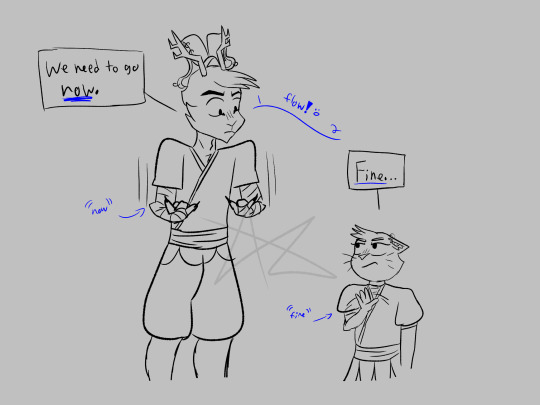
2) Grammar
ASL is its own language, not a word-by-word cipher! It has its own directs, styles, and grammar rules. Here's a chart:
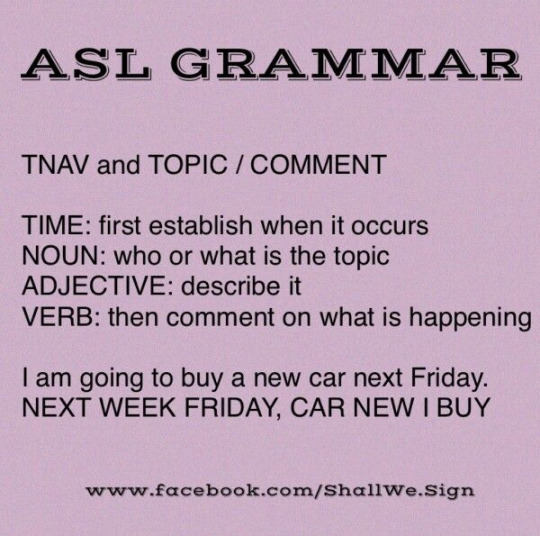
So in that case, you must understand how an English sentence is written in ASL. And THEN determine what is the REAL last sign of person A and first sign of person B.
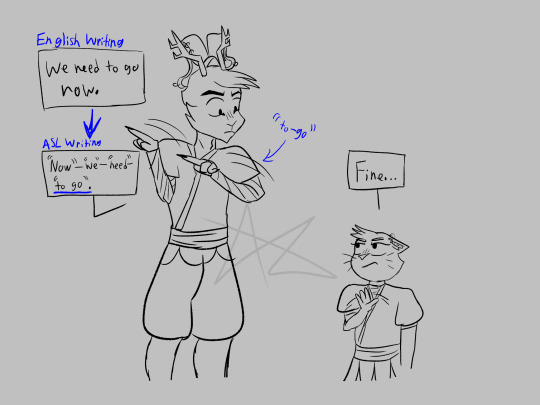
Much better!
3) Emphasis
Given the context, the same sentence can be said very differently. Usually we yell louder when the context is more urgent or exciting.
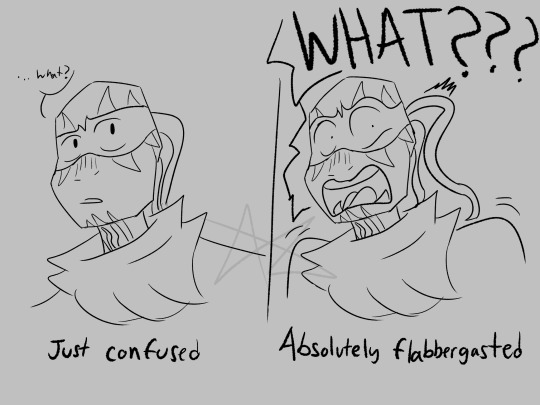
Same applies to ASL. Our signs become more expressive depending on the context. Don't forget that facial expressions play a role in grammar!
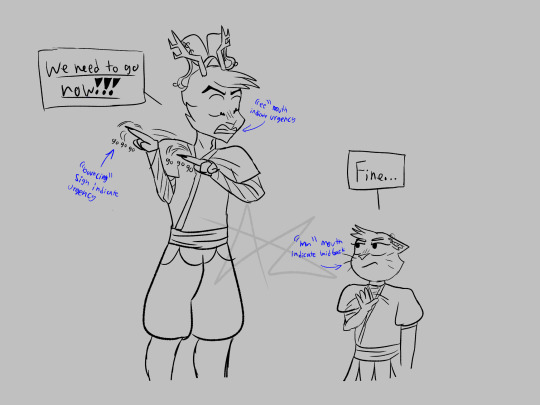
4) Style
Everyone 👏 signs 👏 differently! 👏 If you've met one Deaf person, you've met one Deaf person. Each ASL user has/will have their own unique style. Heck, there’s a thing called Black ASL which is derived of stylized signs used in Black Deaf culture.
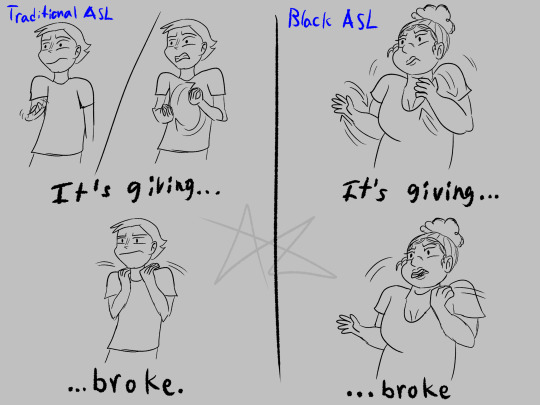
Take the time to know your characters. Their personality, their culture, their environment, and how they learned ASL to begin with. These factors will help each of your characters stand out a bit more and make their signing fit their traits.
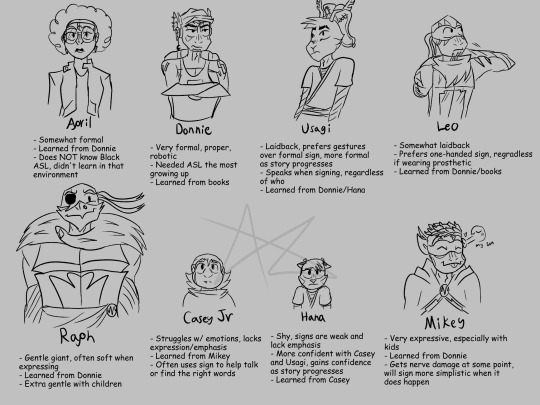
In the end, here's the improvement:
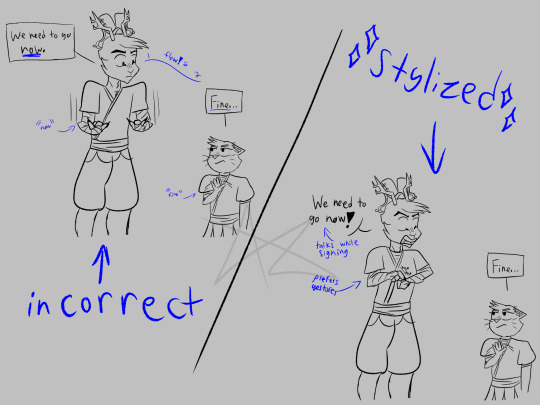
It doesn’t take much to do it right. We are blessed (and cursed) to have the internet where any information you need is at your fingertips, reference multiple sources too. Hope this helps!
Commissions // Ko-Fi Tip Jar // Top Surgery GoFundMe
#we get ASL in episode 3 so i'm making this guide now lol#feral casey au#for fcau#asl#american sign language#sign language#rottmnt#tmnt#rise of the teenage mutant ninja turtles#teenage mutant ninja turtles#writing advice#art advice#disability#disabled artist
199 notes
·
View notes
Text
Hey so after watching six episodes of The Handmaid's Tale I have come to the conclusion that we are approximately two steps left from it happening.
Look, the show practically gives a step by step guide. Look at the American election results, and the way Canadian politics are leaning. We're getting there.
So, heres what you're going to do:
Stash some cash: If you have extra funds, withdraw some. Stash it somewhere you would think to look that other people would not. Useful in all kinds of emergency situations.
Update your paperwork: My passport is expired, I should update that. In my case, I'm a dual citizen so I could get out of dodge fast if I needed to. Keep it somewhere safe with the cash. We're talking passports, birth certificates social security numbers, etc.
Keep physical copies: This is the digital age, but guard physical copies of what you do have closely. I have lots of cds and a cd player, pictures of me and my partner, books. Burning books is already a thing, I highly recommend purchasing books straight off of banned book lists.
Read up on your herbs: Its not witchy voodoo shit if it works. Theres simple stuff, mint tea for nausea, raspberry leaf for cramps, mugwort for you know what. Be careful, I am not saying this is safe, but it may be necessary. Also everybody likes a good cup of tea.
Bug out bag: For if you're really committed. This is a bag for survival situations, or if you have less than two minutes to leave your house. Read about it online. It should have everything you need (clothes, toiletries, food, medication) if you need to leave with what you can fit on your back.
Write: Keep written record about anything you don't want to forget. Journal entries, song lyrics, recipes, whatever. It does not matter, notebooks are something you can throw under one arm and go.
Powerful men are not your friends, religious leaders are not your friends, that acquaintance with questionable world views is not your friend. Create a close network of people you trust with your life. I'm not joking.
I am aware I sound cuckoo bananas to some of you and thats fine. I sound cuckoo bananas to myself. Women are losing agency, queer people are losing their lives, disabled people are being forced further and further under the poverty line. I check all three of the boxes above, this is reality.
If you have to pick one or two, pick Stash some cash and Update your paperwork.
#late night post#the handmaid's tale#project 2025#feminism#survival guide#queer#physically disabled#lesbian#i am terrified#life tips#women are dying#queer people are dying#trans people are dying#disabled people are dying#us elections#politics#canadian politics#cripple punk#goth values
169 notes
·
View notes
Text

potentially hot take but this is a pet peeve of mine
#listen. anyone can write whatever they want and idc I don’t have to engage with it. all power to them!!!!#it’s not even an automatic click-off for me or anything#i just… why. I don’t get it#like… that’s literally one of THE most iconic traits of the entire character. of the entire concept of the SHOW even#and you’re just gonna??? get rid of it??? hello????? the entire basis that John and Arthur’s relationship is made from????????#really????????? possibly the most tender part of their relationship???????#you don’t wanna write fluff about John reading him books and describing things and guiding him????? really?????????#it’s just so boring to me. I don’t understand the appeal#like yeah obviously Arthur as himself would definitely prefer to get his sight back#but as a concept like….#something ab the whole ‘happy ending = the disabled character gets ‘fixed’’ thing just leaves a bad taste in my mouth#why do u have to fix them. why cant they just be disabled. do you think people can’t be happy and be disabled???#idk maybe it’s not that deep. and still I don’t really care that much#it’s just the vibes. I don’t vibe with it.#and I’m sure there’s some actual annoying as hell discourse in the fandom ab it which I have zero interest in engaging in#but I had to have my little petty bitch moment#bc blind Arthur is everything to me. ESPECIALLY in a jarthur context.#anyways thank u for coming to my Ted talk#malevolent#arthur lester#if anyone wants me to tag this as smth Iemme know
159 notes
·
View notes
Text

welcome to "how to accurately write about disability" ft. viktor from arcane (by a dude with the same conditions/aids as viktor) !

pt 1. viktor’s mobility aids & assistive technologies
in the pre-timeskip of season 1, viktor solely uses a cane without any visible bracing; the way he holds his cane is indicative of whether he’s using it as support (handle facing forward) or to help walk (handle facing backwards)


in season 1 after the timeskip, his condition progresses and he upgrades to an unique, arcane-specific mobility aid; it’s a mesh of two types of crutches (forearm crutch & under-arm crutch)



therefore it’s more accurate to refer to viktor’s mobility aid after the timeskip in season 1 as a crutch
given the angles & mirroring, the leg impacted is the left leg (just like me fr) and actually features two different braces but due to the animation of it, sometimes it looks like their combined
viktor has a knee brace & an ankle-foot orthosis, which provides assistance to his knee/ankle/foot
the ankle-foot brace is likely made of metal to stabilize them for walking while the knee brace has some flexibility to it to allow the joint to bend while walking
now onto something very unique about viktor’s condition, his back; what he has on his back (in my opinion) is a blend of a spinal fusion (a surgery in which rods & other metal is inserted into the spine to stabilize the vertebrae) and a traditional back brace
i say it’s a blend of a visible spinal fusion & traditional back brace because of circular scars we can on viktor’s upper back, the aid’s design featuring an almost steampunk visual of the spine and its vertebrae; in addition, the other components of the aid match with ordinary back braces (supportive shoulder strap, full coverage of the spine, etc.)



when someone has a spinal fusion, their physical abilities become limited; they cannot lift over a certain weight, bend, twist, or do any movements that can compromise the spinal fusion
as for the back brace and its structure, i’m sure that it’s very uncomfortable to wear (picture being trapped in a metal corset) but viktor likely has to wear it 24/7 (unless for bathing, i presume? because it’s metal, but idk it’s a fantasy setting so anything comes)

pt 2. what to do before you write
for accuracy, determine what version of viktor you’re writing about; is it act 1 season 1 viktor with a cane? it is act 2-3 season 1 viktor with braces & a crutch? etc. this is important because viktor uses different assistive technology/devices depending on the act or season of the show. once you have that determined, you’re ready to write.
beyond viktor's mobility aids and braces, it's key to incorporate his chronic pain. as someone with his condition (spine disorder), chronic pain is a given. it's something that many writers fail to include when writing viktor or other physically disabled characters like him.

pt. 3 suggestions of what to write
cane & crutch
sounds (i.e. rubber tip thumping against the floor while viktor walks, sudden bang or crash sound effect if viktor drops his aid, etc.)
textures (i.e. feeling the refined wood of the cane, the smooth metal of the crutch, the plush foam of the handles)
visuals (i.e. describe the aid's design, the colors, the engravings, etc.)
complications (i.e. viktor not being able to reach the cane or crutch sometimes when it falls to the floor, the pain in his hand and underarm from constant use)
knee brace & ankle-foot orthosis
sounds (i.e. metal rods grinding against other metal components when viktor walks, the sound of metal hitting the ground with the AFO, creaking/whining of metal)
texture (i.e. how cold the metal is, how stiff the rods that hold the braces together are)
visuals (i.e. describe the details and design of the braces, include things like the color of the metal and the engravings)
complications (i.e. broken rods in the braces, metal cutting viktor when they takes them off)
spinal fusion brace
sounds (i.e. grinding metal against skin, the clicking of the brace's rods, etc.)
textures (i.e. the cold metal, the rigid notches of the vertebrae, etc.)
visuals (i.e. mention the circular scars above the brace, describe the brace's design with mentions of its color and structure, etc.)
misc. additions
try including viktor's thoughts and feelings towards his disabilities and aids; it's not all oh fuck i'm in hell 24/7 when it comes to be disabled. there's an unique humor in disability
viktor can poke people with his cane/crutch, trip people, use it as a pointer, etc.
viktor can make silly or dark jokes/jabs about his disabilities (i.e. jayce, i may be a cripple, but i'm no idiot. or this meeting is more agonizing than the time i fell down the stairwell by the lab- you fell down the stairs?!- i lived.)
include viktor's chronic pain, some areas likely impacted by his disabilities are: legs, back, hands, and underarms
an easy way to show this is through the mention of chronic pain relief tools (i.e. tiger's balm, pain medication (muscle relaxants, opioids), kinesiology tape)
remember that viktor is more than a disabled character; he's an inventor, a scientist, a good-hearted person. he's expressive and has lots of empathy for those like him and the people of zaun. his disabilities influence the path he's on and his experiences, but they are not the sole defining component of viktor's identity.

pt. 4 conclusion & final notes
thank you for taking the time to read this through! if you're able to, please share this with your fellow writers. i hope this post can help folks better represent disabled characters in their writing. if you have any specific questions, message me on tumblr! thanks <3

#hexb0nes writes#arcane#arcane viktor#league of legends#disabled#disability#disabled characters#disabilities#how to#guide#tutorial#tips and tricks
115 notes
·
View notes
Text

My piece for @novaandmali 's current project - A Hitchiker's guide to Art History
It's live on kickstarter right now 👀 it's got a week left so please go check it out!
221 notes
·
View notes
Text
Where to Start Your Research When Writing a Disabled Character
[large text: Where to Start Your Research When Writing a Disabled Character]
So you have decided that you want to make a disabled character! Awesome. But what's next? What information should you decide on at the early phrase of making the character?
This post will only talk about the disability part of the character creation process. Obviously, a disabled character needs a personality, interests, and backstory as every other one. But by including their disability early in the process, you can actually get it to have a deeper effect on the character - disability shouldn't be their whole life, but it should impact it. That's what disabilities do.
If you don't know what disability you would want to give them in the first place;
[large text: If you don't know what disability you would want to give them in the first place;]
Start broad. Is it sensory, mobility related, cognitive, developmental, autoimmune, neurodegenerative; maybe multiple of these, or maybe something else completely? Pick one and see what disabilities it encompasses; see if anything works for your character. Or...
If you have a specific symptom or aid in mind, see what could cause them. Don't assume or guess; not every wheelchair user is vaguely paralyzed below the waist with no other symptoms, not everyone with extensive scarring got it via physical trauma. Or...
Consider which disabilities are common in real life. Cerebral palsy, muscular dystrophy, stroke, cataracts, diabetes, intellectual disability, neuropathy, multiple sclerosis, epilepsy, thyroid disorders, autism, dwarfism, arthritis, cancers, brain damage, just to name a few.
Decide what specific type of condition they will have. If you're thinking about them having albinism, will it be ocular, oculocutaneous, or one of the rare syndrome-types? If you want to give them spinal muscular atrophy, which of the many possible onsets will they have? If they have Ehlers-Danlos Syndrome, which one out of the 13 different types do they have? Is their amputation below, or above the knee (it's a major difference)? Not all conditions will have subtypes, but it's worth looking into to not be surprised later. This will help you with further research.
If you're really struggling with figuring out what exact disability would make sense for your character, you can send an ask. Just make sure that you have tried the above and put actual specifics in your ask to give us something to work with. You can also check out our "disabled character ideas" tag.
Here are some ideas for a character using crutches.
Here are some ideas for a character with a facial difference (obligatory link: what is a facial difference?).
If you already know what disability your character is going to have;
[large text: If you already know what disability your character is going to have;]
Start by reading about the onset and cause of the condition. It could be acquired, congenital, progressive, potentially multiple of these. They could be caused by an illness, trauma, or something else entirely. Is your character a congenital amputee, or is it acquired? If acquired - how recently? Has it been a week, or 10 years? What caused them to become disabled - did they have meningitis, or was it an accident? Again, check what your options are - there are going to be more diverse than you expect.
Read about the symptoms. Do not assume or guess what they are. You will almost definitely discover something new. Example: a lot of people making a character with albinism don't realize that it has other symptoms than just lack of melanin, like nystagmus, visual impairment, and photophobia. Decide what your character experiences, to what degree, how frequently, and what do they do (or don't do) to deal with it.
Don't give your character only the most "acceptable" symptoms of their disability and ignore everything else. Example: many writers will omit the topic of incontinence in their para- and tetraplegic characters, even though it's extremely common. Don't shy away from aspects of disability that aren't romanticized.
Don't just... make them abled "because magic". If they're Deaf, don't give them some ability that will make them into an essentially hearing person. Don't give your blind character some "cheat" so that they can see, give them a cane. Don't give an amputee prosthetics that work better than meat limbs. To have a disabled character you need to have a character that's actually disabled. There's no way around it.
Think about complications your character could experience within the story. If your character wears their prosthetic a lot, they might start to experience skin breakdown or pain. Someone who uses a wheelchair a lot has a risk of pressure sores. Glowing and Flickering Fantasy Item might cause problems for someone photophobic or photosensitive. What do they do when that happens, or how do they prevent that from happening?
Look out for comorbidities. It's rare for disabled people to only have one medical condition and nothing else. Disabilities like to show up in pairs. Or dozens.
If relevant, consider mobility aids, assistive devices, and disability aids. Wheelchairs, canes, rollators, braces, AAC, walkers, nasal cannulas, crutches, white canes, feeding tubes, braillers, ostomy bags, insulin pumps, service dogs, trach tubes, hearing aids, orthoses, splints... the list is basically endless, and there's a lot of everyday things that might count as a disability aid as well - even just a hat could be one for someone whose disability requires them to stay out of the sun. Make sure that it's actually based on symptoms, not just your assumptions - most blind people don't wear sunglasses, not all people with SCI use a wheelchair, upper limb prosthetics aren't nearly as useful as you think. Decide which ones your character could have, how often they would use them, and if they switch between different aids.
Basically all of the above aids will have subtypes or variants. There is a lot of options. Does your character use an active manual wheelchair, a powerchair, or a generic hospital wheelchair? Are they using high-, or low-tech AAC? What would be available to them? Does it change over the course of their story, or their life in general?
If relevant, think about what treatment your character might receive. Do they need medication? Physical therapy? Occupational therapy? Orientation and mobility training? Speech therapy? Do they have access to it, and why or why not?
What is your character's support system? Do they have a carer; if yes, then what do they help your character with and what kind of relationship do they have? Is your character happy about it or not at all?
How did their life change after becoming disabled? If your character goes from being an extreme athlete to suddenly being a full-time wheelchair user, it will have an effect - are they going to stop doing sports at all, are they going to just do extreme wheelchair sports now, or are they going to try out wheelchair table tennis instead? Do they know and respect their new limitations? Did they have to get a different job or had to make their house accessible? Do they have support in this transition, or are they on their own - do they wish they had that support?
What about *other* characters? Your character isn't going to be the only disabled person in existence. Do they know other disabled people? Do they have a community? If your character manages their disability with something that's only available to them, what about all the other people with the same disability?
What is the society that your character lives in like? Is the architecture accessible? How do they treat disabled people? Are abled characters knowledgeable about disabilities? How many people speak the local sign language(s)? Are accessible bathrooms common, or does your character have to go home every few hours? Is there access to prosthetists and ocularists, or what do they do when their prosthetic leg or eye requires the routine check-up?
Know the tropes. If a burn survivor character is an evil mask-wearer, if a powerchair user is a constantly rude and ungrateful to everyone villain, if an amputee is a genius mechanic who fixes their own prosthetics, you have A Trope. Not all tropes are made equal; some are actively harmful to real people, while others are just annoying or boring by the nature of having been done to death. During the character creation process, research what tropes might apply and just try to trace your logic. Does your blind character see the future because it's a common superpower in their world, or are you doing the ancient "Blind Seer" trope?
Remember, that not all of the above questions will come up in your writing, but to know which ones won't you need to know the answers to them first. Even if you don't decide to explicitly name your character's condition, you will be aware of what they might function like. You will be able to add more depth to your character if you decide that they have T6 spina bifida, rather than if you made them into an ambiguous wheelchair user with ambiguous symptoms and ambiguous needs. Embrace research as part of your process and your characters will be better representation, sure, but they will also make more sense and seem more like actual people; same with the world that they are a part of.
This post exists to help you establish the basics of your character's disability so that you can do research on your own and answer some of the most common ("what are symptoms of x?") questions by yourself. If you have these things already established, it will also be easier for us to answer any possible questions you might have - e.g. "what would a character with complete high-level paraplegia do in a world where the modern kind of wheelchair has not been invented yet?" is more concise than just "how do I write a character with paralysis?" - I think it's more helpful for askers as well; a vague answer won't be of much help.
I hope that this post is helpful,
mod Sasza
#mod sasza#writing reference#writing advice#writing resources#writeblr#writing disabled characters#writing resource#long post#writing tips#writing guide
4K notes
·
View notes
Text
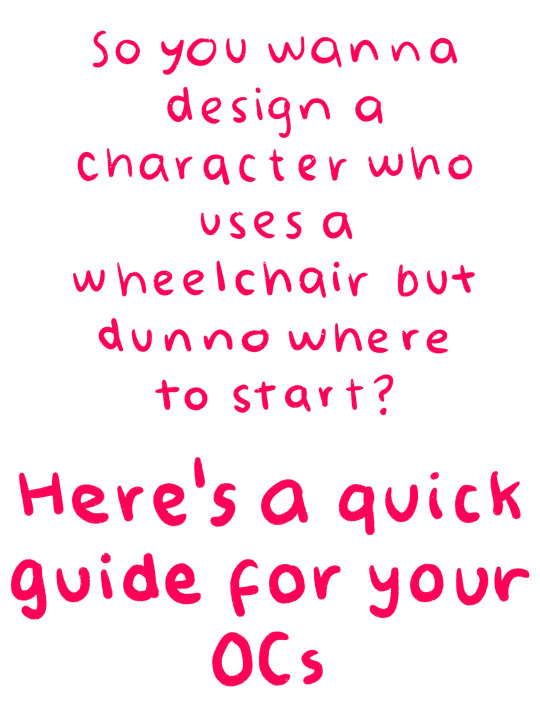
OC WHEELCHAIR GUIDE
I remade this guide to be a bit easier to read, less info dumping, a bit more specific info and stuff for you to understand, and also some stuff to help people decide which chair would be best for their characters!
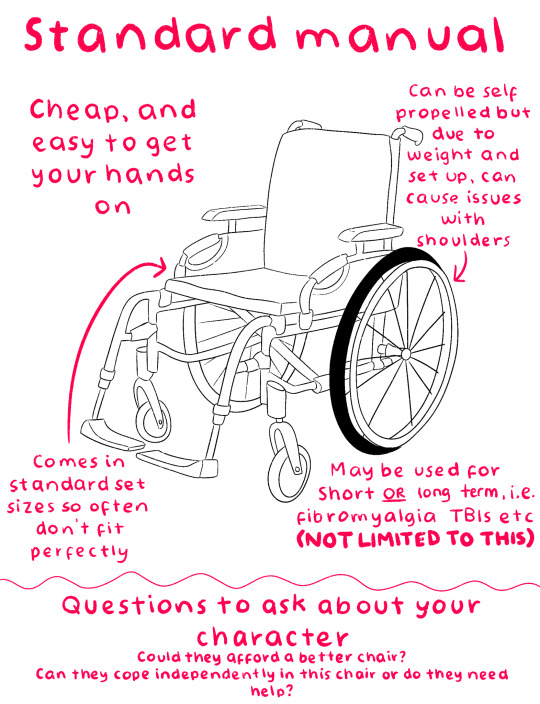
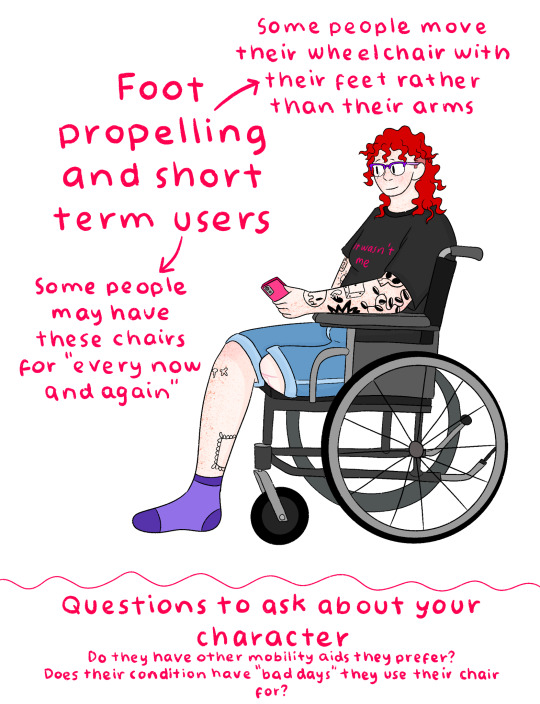
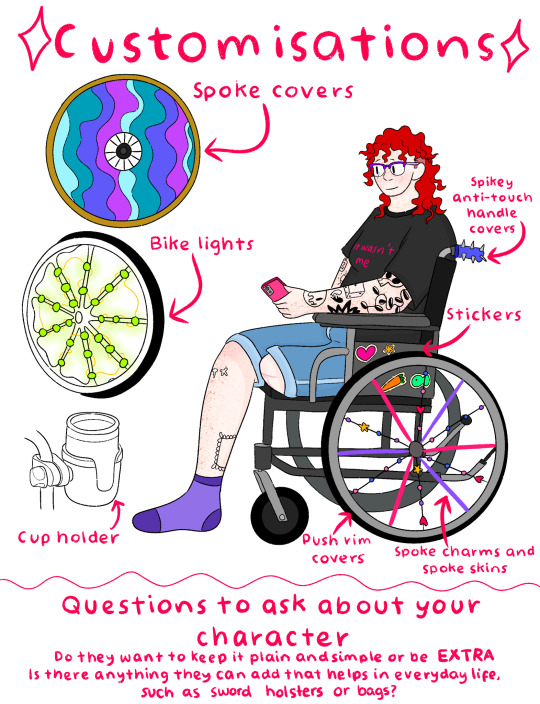
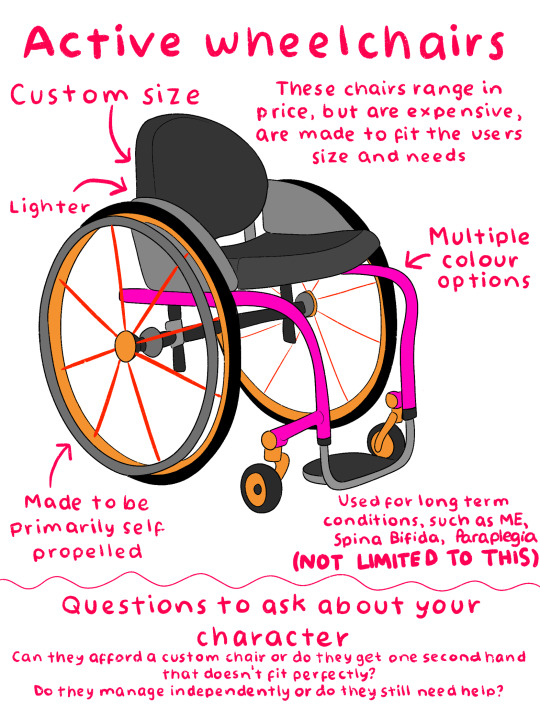
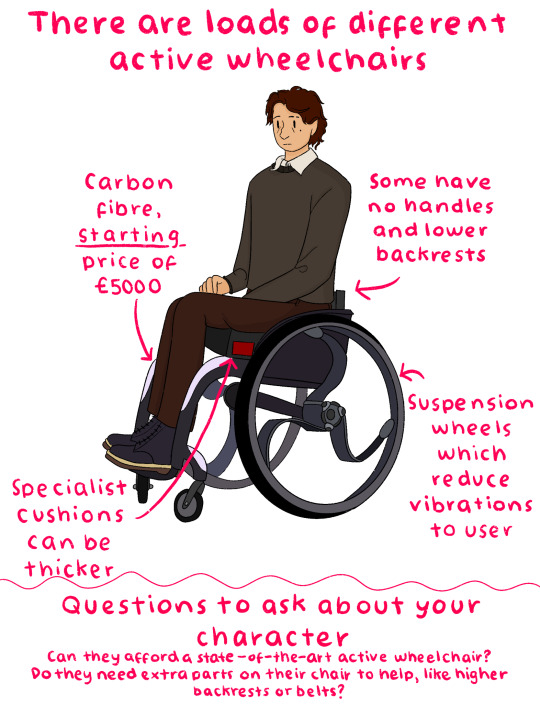
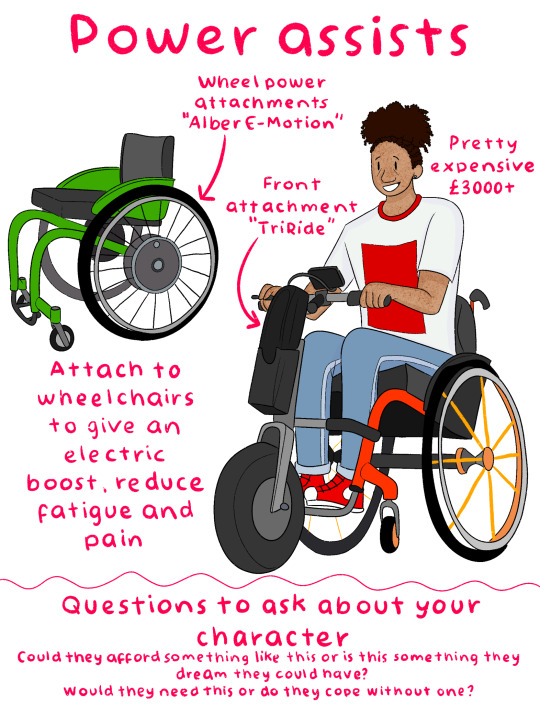



#art#original art#artist#queer#oc art#original character#disabled#disabled rights#disability#disability pride month#oc#oc guide#character guide#writing tips#character tips#author tips#tutorial#art tutorial
507 notes
·
View notes
Text
she keeps me on the smooth pavement to help prevent my tripping on the uneven cobblestones 🥹🥰
video description below
A sable German Shepherd is guiding OP along a smooth section of pavement in the middle of a cobblestone walkway. The dog is outfitted with a black leather harness and cape with teal and grass green patches & accessories. There is indistinct chatter in the background.
#disability#assistance dog#service dog#not a guide dog#this place is hella inaccessible#and my meds have stopped working 🤙#cão#cão de assistencia#german shepherd#disabled
31 notes
·
View notes
Text
i had an autistic rage meltdown thingy today and afterwards i was mad at myself for being unable to communicate somthin important during it (i literally was unable to speak outloud or gesture what i wanted to say, but luckily my supportiv roommate figured it out anyway)...
and i was like..... wait.... was it one of those "verbal shutdown" things???
and i thought of that Human Domestication Guide fanfiction Wellness Check and how the autistic protagonist in it was unable to speak when their emotions & neurology got overstimulated.....
and i thoght Whoa it was almost like that
then i was like Wait does that mean iv been having verbal shutdowns my whole life and i just didnt notice?????? becuz they overlapped with rage meltdowns???????
so yeah thank u HDG for helpin me figure out my autism symptoms lol
#hdg shitposting#hdg posting#human domestication guide#floretposting#affini#autism#good floret#transfem#trans femme#autistic things#verbal shutdown#meltdown#autistic meltdown#nonverbal#nonverbal autism#trans woman#disability#wellness check
36 notes
·
View notes
Text
Going up to a guide dog user and saying, to their dog, something along the lines of “your mommy doesn’t let me pet you. I know, it’s so unfair,” in a baby voice is first of all counterproductive, because that’s just as distracting for the dog as petting them would be, and second of all, is actually really casually guilt trippy and I don’t like it
#PSA#please stop#it makes me feel like I’m being a shitty person even though you’re the one who’s disrespecting the rules of engagement#disability things#guide dogs#service dog
87 notes
·
View notes
Text
Okay I've had some water and took my meds so it's time for Hermit's Guide to Public Flare Care!™ I will just be going over small, affordable things that can be carried in a backpack or bag. And by affordable, I mean $25 or less items. This list also focuses on general care, but leans towards care for chronic pain.
1) Electrolyte Drink Mix - Whether it's Gatorade powder, Liquid IV, Nuun, or something else. Being properly hydrated and having balanced electrolytes can help with various issues. Pick your favorite flavor!
2) Peppermint oil roller/Migrastick - A little self explanatory, if you deal with migraines, it can help a lot.
3) Tiger balm - For pain! But if you have pets, don't let them lick the area covered in Tiger balm! Otherwise, the warming sensation can also be good as a type of grounding technique when you get overwhelmed.
4) Emergency ibuprofen/Tylenol/Benadryl - in case you need it. Doesn't have to be a whole bottle, just a little travel pill case of them.
5) Snacks - Sometimes you just need a little pick me up, sometimes it's to help blood sugar.
And if you can afford it/need it, here are some other suggestions for items to carry!
- Compression items (like gloves)
- Magnesium lotion (or a lotion of your choice)
- earplugs/earbuds/headphones
- Fidget toy/chew item/gum (sometimes that works in place of other stuff)
- Notepad and pen (for communication or note taking)
And that's my quick and dirty guide to a basic public flare kit! I'm sure there are other small, affordable items that others can think of, and each person has different needs. If you figure something out better for yourself, please share!
#chronic illness#disabled#spoonie#chronic pain#disability#chronically ill#Hermit's Guide to Being Sick
116 notes
·
View notes
Text
Service Dog Mini Guide
Hello!! Just wanted to present some facts about service dogs as a service dog handler myself! Feel free to ask any questions that you may have as well! My current service dog, Ahsoka, has been working for 3 years, and service dogs have been a lot that I research about! (This is research is based in the US)
How are service dogs helpful?
Service dogs can be helpful in a variety of ways, and it really varies from handler to handler. For example, guide dogs help guide their blind handler! Or a service dog alerting to a high heart rate! It varies based on your need, but typically, they help regardless.
What types of service dogs are there?
• Psychiatric Service Dog
• Dissociation Response Dog
• Autism Assistance Dog
• Seizure Alert Service Dog
• Diabetic Alert Service Dog
• Cardiac Alert Service Dog
• Allergen Detection Service Dog
• POTS Alert Service Dog
• Hearing Service Dog
• Guide Dogs For The Blind
• Dual Sensory (Deafblind) Service Dog
• Mobility Service Dog
• Medical Detection Service Dog
• Cancer Detection Service Dog
Mind you, Cancer Detection service dogs I mostly see used in hospitals to help detect if a patient has cancer! Multi-purpose service dogs also are a thing where they may have both, for example, psychiatric tasks and medical tasks.
Also, if your disability wasn’t up there, that doesn’t mean a service dog can’t help with it! I just put what I can remember right at the top of my head!
What tasks can service dogs perform?
Here is a giant list of service dog tasks! Be aware though that any task that requires the dog to leave your side in a public space is dangerous. If you are a faint risk or have a disability that when you’re down you’ll need help, please train a bark alert for your dog. The dog will bark until someone comes! The reason why the dog leaving is risky is because he/she can get hurt, attacked by another dog, or even stolen. A task that requires the dog to leave you entirely should only be done at home or somewhere safe that nothing bad can come to the dog (NOT in public).
Do emotional support animals, Therapy dogs, and/or Guard dogs count as service dogs?
They do not! A service dog is defined as a dog that is individually trained to do work or perform tasks for the benefit of an individual with a disability.
Emotional support animals are not task-trained; therefore, they aren’t allowed in non-pet-friendly spaces.
Therapy dogs can sometimes be allowed in public spaces if requested by a school, hospital, etc. However, therapy dogs help more than one person and are also not task-trained.
Guard dogs are not task-trained, and service dogs cannot show any aggression towards the public or someone else. (I don’t count if your dog is attacked and they’re defending themselves against another dog.)
Do service dogs need identification or certifications?
Service dogs do NOT need to wear any kind of service dog vests or tags as it’s not a requirement per the Americans Disabilities Act.
In the US, we have no certifications either! People make fake ones online, but they do no justice as they aren’t real or official.
A college or school may ask for a doctor’s note for proof of disability and why you might need a service dog to give you accommodations for you and your service dog. This, however, is not a legal certification! Just a doctor’s note that can be written by a doctor, mental health professional, etc.!
How do I get a service dog? Can they be any breed?
A service dog can be trained by the owner, an organization, or a trainer that isn’t part of an organization!
Owner training is the route I went because it’s more accessible in my opinion and less expensive. BUT, it can take longer (depends on the dog), and if you’re not willing to be patient or learn how to train a dog, then it can be draining for you.
Getting a dog from an organization can be good; however, a service dog can cost up to possibly $ 50k depending on the location. Placement with a service dog can also potentially take a few years.
A trainer training a dog you already have could also be good, as it’s cheaper than getting a dog from an organization but still more expensive than overtraining.
At the end of the day, though, it’s whatever you can afford! A service dog can also be any breed and size; there are no limits! It’s only if you need mobility tasks or possible guide tasks that a small dog is NOT recommended for.
Resources + Last minute notes
Service dogs by Xenix is a slide show made by me! Feel free to use it as much as you like! Questions and concerns can be commented or DM’d to me! However, please do not seek medical advice from me as I can’t give you any! Only things on service dogs!
Thank you for reading!
-K9
#k9bark#disability#chronic pain#disabled#chronic illness#invisible disability#chronic fatigue#chronically ill#pots#pots syndrome#guide dog#service dog#working dogs#disabilities#disabled person#disabled people#assistance dog#mental health#mental illness#actually mentally ill#actually disabled
22 notes
·
View notes
